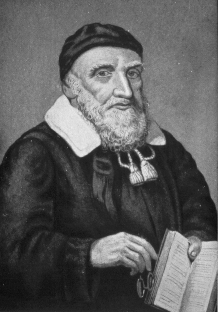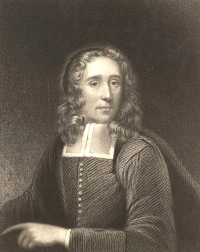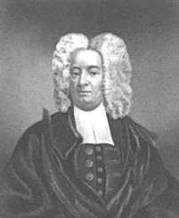Controverscial.Com
![]()
Welcome
![]()
|
Controverscial.Com
Welcome
|
|
|
Controverscial.Com
Welcome
|



![]()



Richard Mather / Increase Mather / Cotton Mather
After the settlement of the Plymouth Bay Colony by the Forefathers in 1620, Puritanism remained the dominant religion in force throughout New England. Three of the most influential and prominent Puritan clergymen in those early days came from the same family. Richard Mather arrived in the colony in 1635, and a year later became pastor of the Dorchester parish. His son Increase Mather become minister of the North Church in Boston in 1661, while his son in turn, Cotton Mather, initially an assistant pastor to his father, after his fathers death in 1723 assumed full responsibility as minister for the same church.
Richard Mather was born in Lowton, a village in the parish of Winwick near Liverpool, England in 1596. His grandfather was John Mather (1550), his father Thomas Mather (1575-1633) and his mother Margaret Abrams. The Mather family was descended from a line of yeoman land farmers (a class of wealthy Englishmen freeholders, below that of titled gentry, who cultivate their own land) who had strong puritan beliefs and connections. The family ‘Coat-of-Arms’ is thought to have originated through one of his uncles and is attributed to a William Mather of Salop, of around 1602 (Salop is the former name of Shropshire, a county in England). The arms indicate that William was at sometime Knighted, and may have held high office such as that of a Judge.

“Heraldic Art is the science of arms or coats of
arms. It was born the Middle Ages during the age of chivalry in order to
permit persons to recognize their friends or enemies under their armors. The
first armorials were painted on shields. Nobility marked their possessions with
their arms as a method of identification. They would also have seals made in
order to be affixed to their opinions, judgments, decisions, and their charters.
Their arms would often be engraved on their chairs, their church pews, painted
on the walls of their castles, worked in stain glass, and sculpted on their
tombs,
etc.
This coat of arms is found in "Promptuarium
Armorum," and is there recorded as the arms of William Mather of Salop,
1602. Motto, "Sunt Fortia Pectora Nobis (Are Perhaps To comb Us). This
motto is also used, "Virtus Vera Nobilitas Est” (Valor Vera Celebrity
Is). The following is the description of the arms that was in the family of the
early Mathers of Boston as described by Horace Mather: "Ermine on a fesse
wavy Azure, three lions rampant Or Crest, a lion sedant Or." Ermine (the
black figures like those seen on ermine robes of Judges in England) indicates
that the head of the family at some time held the office of a Judge. The Lion is
used in arms to denote courage, strength, and magnanimity. The Fesse indicates
the belt of a Knight. In heraldic language, Or means gold and is an emblem of
great worth. Azure means blue."
In the early days of the 17th century, during the reign of James I, a band of Puritans cleared away the heavy forests to the south of the City of Liverpool, and settled what is known as Toxteth Park. They looked upon the burning of Robert Barnes and John Bradford (1540) in Smithfield, Cumbria, as martyrs to there cause and erected a stone chapel in their honor so they might hear the doctrines of the Reformation. The chapel, which still exists, is a plain square building with no steeple or belfry. Among the tablets on the interior walls is one bearing the inscription: “Near this walk rest the remains of several generations of an ancient family of yeomanry named Mather, who were settled in Toxteth Park as early as the reign of Queen Elizabeth. They were distinguished by many virtues and by strong religious feeling, and were among the fairest specimens of those who, in former times, were called Puritans”.
Richard Mather started his education at Winwick grammar
school, were at the age of just 15 he was made a schoolmaster.
From 1611-15, he taught at a newly established school in Toxteth Park,
Liverpool, while studying for the ministry.
In 1615 he entered Brasenose College Oxford for three years, before
returning to Toxteth Park in November 1618 to preach.
In early 1619, he was ordained as a deacon in the Church of England by
Bishop Morton of Chester, and remained
in Toxteth Park for the next 15 years.
On the 29th of September
1624, Richard married Katharine Hoult (1596-1655), a daughter of Edmund Hoult of Bury.
Together they had seven
children, six sons and a daughter: Elizabeth
Mather (1625),
Samuel Mather (13th of May 1626),
Timothy Mather (1628),
Nathaniel Mather (20th
March 1630), Eleazer
Mather (13th May 1637), Joseph
Mather (1634) and
Increase Mather (21 June, 1639).
Of his six
sons, four would became clergymen in New England, Increase being the most
prominent, while Samuel
and Nathaniel Mather returned
to England and lived out their lives in Great Britain and Ireland.
In August-November of 1633, Richard was suspended by the Church of England authorities for nonconformity in matters of ceremony, but was re-instated after the intercession of friends. In the following year 1634, after a visit by Richard Neile the Archbishop of York, who hearing that he had never worn a surplice during the fifteen years of his ministry, refused his re-instatement on the grounds of non-conformity due to his Puritan and Separatist views.
This was not so unusual during those times for many sought a middle ground between Protestantism and Catholicism, but while he had a great reputation as a preacher in and about Liverpool, it was to no avail. Later, through letters from John Cotton and Thomas Hooker, who like him had been excommunicated for their beliefs and fled to America to avoid persecution, he was persuaded to join them in that new land of hope and opportunity. Joining a new company of pilgrims on the 16th April 1635, he embarked on a ship called the ‘James’ from Bristol, and arrived in Boston four months later on the 17th August 1635.
In his own manuscript journal recording the period for
1635, Richard gives a description of his voyage across the Atlantic.
In it he describes how the ship set sail loaded with 100 passengers, 23
seamen, 23 cows, 3 sucking calves and 8 mares.
He claims none of the animals died during the voyage, (though we suspect
some may have been slaughtered to provide food).
One woman apparently suffered from scurvy, which he attributed to a lack
of exercise “for the want of walking and stirring of her body upon ye deck”.
He also describes a storm on the Atlantic in which they lost anchors,
sails and many other things. His manuscript journal for 1635 is one among more than 1500
printed books that once belonged to Richard, Increase, Cotton, and Samuel, their
families, colleagues and correspondents, which constitutes the American
Antiquarian Society’s ‘Mather Family Library’.
After his arrival in Boston, Richard found that a parish Church in Dorchester, had been left vacant, deserted by its minister who had left to form a new church in Windsor, Connecticut, taking part of the congregation with him. In the following year Richard moved to Dorchester and was elected pastor of the vacant parish, a position he held until his death. During that time religious discussion was centered not so much on Church doctrine and forms of worship, but more upon the status of Church government. Richard played an active part such discussions and was chosen to answer on behalf of the colonies ministers, thirty-two questions relating to Church government that were propounded by the general court in 1639.
In 1640, Richard helped to prepare and publish the “Bay Psalm Book”, a common hymnal for the Massachusetts Bay colony. Written by Richard Mather, John Eliot, and Thomas Weld, it was published in Cambridge as “The Whole Book of Psalms Faithfully Translated into English”. This was the first book to be published in the New Colonies. Richard followed this in 1643 with “Church-Government and Church-Covenant Discussed” and “Apologie of the Churches in New-England for Church Covenant”, this second publication is the earliest comprehensive presentation of New England Puritan Church doctrine, and at the time served as the standard justification for Church policy and action.
As a member of the synod of 1648, Richard wrote what was
to become known as the “Cambridge Platform” adopted by the synod.
This was a series of responses to critics of the New England Church who
favored a Presbyterian Church structure, it was published as “A Platform of
Church-Discipline Gathered Out of the Word of God, Mather, John Cotton, and
others” and served as the basic tenets of New England Congregationalism
until the adoption of the “Saybrook Platform” in 1708.
During his time in New England, Richard severed as a member of every
synod convened and was moderator of a synod at the time of his death.
Richard’s next book in 1652 was “The Summe of
Certain Sermons Upon Genes”, his only published collection of sermons.
His style has been described as simple and practical, and his views show
moderation concerning the various religious disputes of those times.
Richard’s first wife Katherine died in 1655, and a year later he
married Sarah Hawkridge
the widow of John
Cotton, one of the first and leading Puritan ministers to settle in the
colonies.
His last book “A Farewell Exhortation to the Church and People of Dorchester in New England” (1652) was a personal sermon on the loss of piety and a call for a renewed commitment to God. Richard Mather died in Dorchester, Massachusetts on the 22nd of April 1669. His tomb contains a Latin inscription and lies in the old burying ground at Dorchester.
In his ‘Last Will and Testament’, Richard leaves us an interesting view of life in those times. To his son Timothy he left “his house, barn and lands in Dorchester, and all moveable goods including servants”, he was also made one of the executors of his Will. To Sarah, his wife for the past thirteen years, Richard gave her free liberty to live for just 3 or 4 months in his house after his death, plus 100 pounds, after which she would have to re-marry or become an out-cast widow.
![]()
Yet to be added
First published on the 04 March 2007, 18:22:06 © George Knowles

Let there be peace in the world - Where have all the flowers gone?
My Personal Page / My Place in England, UK / My Family Tree (Ancestry)
Wicca/Witchcraft / What is Wicca / What is Magick
Traditional Writings:
Wiccan Rede / Charge of the Goddess / Charge of the God / The Three-Fold Law (includes The Law of Power and The Four Powers of the Magus) / The Witches Chant / The Witches Creed / Descent of the Goddess / Drawing Down the Moon / The Great Rite Invocation / Invocation of the Horned God / The 13 Principles of Wiccan Belief / The Witches Rede of Chivalry / A Pledge to Pagan Spirituality
Correspondence Tables:
Incense / Candles / Colours / Magickal Days / Stones and Gems / Elements and Elementals
Traditions Part 1 - Alexandrian Wicca / Aquarian Tabernacle Church (ATC) / Ár Ndraíocht Féin (ADF) / Blue Star Wicca / British Traditional (Druidic Witchcraft) / Celtic Wicca / Ceremonial Magic / Chaos Magic / Church and School of Wicca / Circle Sanctuary / Covenant of the Goddess (COG) / Covenant of Unitarian Universalist Pagans (CUUPS) / Cyber Wicca / Dianic Wicca / Eclectic Wicca / Feri Wicca /
Traditions Part 2 - Gardnerian Wicca / Georgian Tradition / Henge of Keltria / Hereditary Witchcraft / Hermetic Order of the Golden Dawn (H.O.G.D.) / Kitchen Witch (Hedge Witch) / Minoan Brotherhood and Minoan Sisterhood Tradition / Nordic Paganism / Pagan Federation / Pectic-Wita / Seax-Wica / Shamanism / Solitary / Strega / Sylvan Tradition / Vodoun or Voodoo / Witches League of Public Awareness (WLPA) /
Gods and Goddesses (Greek
Mythology) / Esbats &
Full Moons / Links
to Personal Friends & Resources / Wicca/Witchcraft
Resources / What's a spell? /
Circle Casting and
Sacred Space / Pentagram
- Pentacle / Marks
of a Witch / The Witches
Power / The Witches Hat
/ An
esoteric guide to visiting London / Satanism
/ Pow-wow
/ The
Unitarian Universalist Association / Numerology: Part 1
/ Part 2 / Part
3 / A
history of the Malleus Maleficarum: includes: Pope
Innocent VIII /
The
papal Bull /
The
Malleus Maleficarum /
An extract from the Malleus Maleficarum
/ The letter of approbation
/ Johann
Nider’s Formicarius /
Jacob
Sprenger /
Heinrich Kramer /
Stefano Infessura
/ Montague Summers /
The Waldenses
/ The Albigenses
/
The Hussites / The
Sun Dance
/ Shielding (Occult
and Psychic Protection) /
Sabbats in History and Mythology / Samhain (October 31st) / Yule (December 21st) / Imbolc (February 2nd) / Ostara (March 21st) / Beltane (April 30th) / Litha (June 21st) / Lughnasadh (August 1st) / Mabon (September 21st)
Rituals contributed by Crone: Samhain / Yule / Imbolc / Ostara / Beltane / Litha / Lammas / Mabon
Tools of a Witch / The Besom (Broom) / Poppets and Dolls / Pendulums / Cauldron Magick / Mirror Gazing
Animals in Witchcraft (The Witches Familiar) / Antelope / Bats / Crow / Fox / Frog and Toads / Goat / Honeybee / Kangaroo / Lion / Owl / Phoenix / Rabbits and Hares / Raven / Robin Redbreast / Sheep / Spider / Squirrel / Swans / Wild Boar / Wolf / Serpent / Pig / Stag / Horse / Mouse / Cat
In Worship of Trees - Myths, Lore and the Celtic Tree Calendar. For descriptions and correspondences of the thirteen sacred trees of Wicca/Witchcraft see the following: Birch / Rowan / Ash / Alder / Willow / Hawthorn / Oak / Holly / Hazel / Vine / Ivy / Reed / Elder. Also see: The Willow Tree (Folk Music)
Mystical Sacred Sites - Stonehenge / Glastonbury Tor / Malta - The Hypogeum of Hal Saflieni / Avebury / Cerne Abbas - The Chalk Giant / Ireland - Newgrange /
Rocks and Stones:
Stones - History, Myths and Lore
Articles contributed by Patricia Jean Martin: / Apophyllite / Amber / Amethyst / Aquamarine / Aragonite / Aventurine / Black Tourmaline / Bloodstone / Calcite / Carnelian / Celestite / Citrine / Chrysanthemum Stone / Diamond / Emerald / Fluorite / Garnet / Hematite / Herkimer Diamond / Labradorite / Lapis Lazuli / Malachite / Moonstone / Obsidian / Opal / Pyrite / Quartz (Rock Crystal) / Rose Quartz / Ruby / Selenite / Seraphinite / Silver and Gold / Smoky Quartz / Sodalite / Sunstone / Thunderegg / Tree Agate / Zebra Marble
Wisdom:
Knowledge vs Wisdom by Ardriana Cahill / I Talk to the Trees / Awakening / The Witch in You / A Tale of the Woods
Articles and Stories about Witchcraft:
Murder by Witchcraft / The Fairy Witch of Clonmel / A Battleship, U-boat, and a Witch / The Troll-Tear (A story for Children) / Goody Hawkins - The Wise Goodwife / The Story of Jack-O-Lantern / The Murder of the Hammersmith Ghost / Josephine Gray (The Infamous Black Widow) / The Two Brothers - Light and Dark
Old Masters of Academia:
Pliny the Elder / Hesiod / Pythagoras
Abramelin the Mage / Agrippa / Aidan A. Kelly / Albertus Magnus “Albert the Great” / Aleister Crowley “The Great Beast” / Alex Sanders "the King of the Witches” / Alison Harlow / Amber K / Anna Franklin / Anodea Judith / Anton Szandor LaVey / Arnold Crowther / Arthur Edward Waite / Austin Osman Spare / Biddy Early / Bridget Cleary / Carl Llewellyn Weschcke / Cecil Hugh Williamson / Charles Godfrey Leland / Charles Walton / Christina Oakley Harrington / Damh the Bard (Dave Smith) / Dion Fortune / Dolores Aschroft-Nowicki / Dorothy Morrison / Doreen Valiente / Edward Fitch / Eleanor Ray Bone “Matriarch of British Witchcraft” / Dr. John Dee and Edward Kelly / Dr. Leo Louis Martello / Eliphas Levi / Ernest Thompson Seton / Ernest Westlake and the Order of Woodcraft Chivalry / Fiona Horne / Friedrich von Spee / Francis Barrett / Gerald B. Gardner / Gavin and Yvonne Frost and the School and Church of Wicca / Gwydion Pendderwen / Hans Holzer / Helen Duncan / Herman Slater "Horrible Herman" / Israel Regardie / James "Cunning" Murrell / Janet Farrar & Gavin Bone / Jessie Wicker Bell “Lady Sheba” / John Belham-Payne / John George Hohman / John Gerard / John Gordon Hargrave (the White Fox) / John Michael Greer / John Score / Johannes Junius the Burgomaster of Bamberg / Joseph John Campbell / Karl von Eckartshausen / Laurie Cabot "the Official Witch of Salem" / Lewis Spence / Margaret Alice Murray / Margot Adler / Marie Laveau the " Voodoo Queen of New Orleans" / Marion Weinstein / Matthew Hopkins “The Witch-Finder General” / Max Ehrmann and the Desiderata / Monique Wilson the “Queen of the Witches” / Montague Summers / Nicholas Culpeper / Nicholas Remy / M. R. Sellers / Mrs. Grieve "A Modern Herbal" / Oberon and Morning Glory Zell-Ravenheart / Old Dorothy Clutterbuck / Old George Pickingill / Paddy Slade / Pamela Colman-Smith / Paracelsus / Patricia Crowther / Patricia Monaghan / Patricia “Trish” Telesco / Philip Emmons Isaac Bonewits / Philip Heselton / Raymond Buckland / Reginald Scot / Robert Cochrane / Robert ‘von Ranke’ Graves and "The White Goddess" /
Rudolf Steiner / Rosaleen Norton “The Witch of Kings Cross” / Ross Nichols and The Order of Bards, Ovates & Druids / Sabrina - The Ink Witch / Scott Cunningham / Selena Fox / Silver Ravenwolf / Sir Francis Dashwood / Sir James George Frazer / S.L. MacGregor Mathers and the “Hermetic Order of the Golden Dawn” / Starhawk / Stewart Farrar / Sybil Leek / Ted Andrews / The Mather Family - includes: Richard Mather, Increase Mather, Cotton Mather / Thomas Ady / Vera Chapman / Victor Henry Anderson / Vivianne Crowley / Walter Brown Gibson / William Butler Yeats / Zsuzsanna Budapest
Many of the above biographies are brief and far from complete. If you know about any of these individuals and can help with aditional information, please cantact me privately at my email address below. Many thanks for reading :-)
While I have taken due care and dilligence to credit all sources where possible, this website may contain copyrighted material which has not been specifically authorized by the copyright owner. My use of making such material available here is done so in my efforts to advance our understanding of religious discrimination, the environmental and social justice issues etc. If you wish to use copyrighted material from this wedsite for purposes of your own then you must obtain permission from the relevant copyright owner yourself.
![]()
My online email discussion group:
http://groups.yahoo.com/group/Email_Witches

Help send a message of peace around the world! The Dove of Peace flies from site to site, through as many countries as possible. It does not belong to ANY belief system. Please help make a line around the globe by taking it with you to your site, by giving it to someone for their site, by passing it on to another continent or to the conflict areas of the world. May trouble and strife be vanquished in it's path.

mailto:George@controverscial.com
![]()
|
|